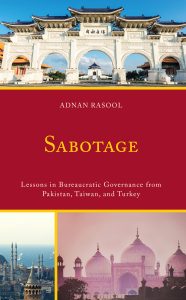Research
 My current research interests are mainly in the fields of comparative politics, international relations, and pedagogical innovation. My research philosophy is rooted in trying to answer questions that not only have academic implications but also real-world policy impacts. That is why most of my current research explores overarching questions that we face as states and communities.
My current research interests are mainly in the fields of comparative politics, international relations, and pedagogical innovation. My research philosophy is rooted in trying to answer questions that not only have academic implications but also real-world policy impacts. That is why most of my current research explores overarching questions that we face as states and communities.
My book, Sabotage: Lessons in Bureaucratic Governance from Pakistan, Taiwan, and Turkey, addresses the question: How does a state continue functioning and ensuring public service delivery even during times of political crisis? by arguing that a high-quality bureaucracy operating with institutional autonomy. Using primary data collected through extensive fieldwork in Pakistan, Turkey, and Taiwan, it explains how bureaucracy is the lynchpin that can save or sabotage a state.
My current research interests are mainly in the fields of comparative politics, international relations, and pedagogical innovation in Higher Education. My research philosophy is rooted in trying to answer questions that not only have academic implications but also real-world policy impacts. That is why most of my current research explores overarching questions that we face as states and communities.
My research has appeared regularly in journals like Asian Politics & Policy (APP), the Journal of Indian and Asian Studies (JIAS), and the Journal of Political Science Education (JPSE).
 My future research agenda is focused on two areas: Comparative Analysis of Trade and Diplomacy in Southeast Asia and Pedagogical Innovation. The newer work I am pursuing, for which I have won a generous travel grant from the Office of Research and Sponsored Programs at UTM, studies how small states, particularly in East Asia, exert an outsized influence in foreign policy courtesy of soft power.
My future research agenda is focused on two areas: Comparative Analysis of Trade and Diplomacy in Southeast Asia and Pedagogical Innovation. The newer work I am pursuing, for which I have won a generous travel grant from the Office of Research and Sponsored Programs at UTM, studies how small states, particularly in East Asia, exert an outsized influence in foreign policy courtesy of soft power.
I am also interested in exploring the role organizations like the Association of Southeast Asian Nations (ASEAN) play in maintaining neutrality in the region. I am working on comparatively analyzing the approach the US and China are taking in the Indo-Pacific about building alliances. In tune with this work, I am in the early stages of exploring how Pacific island nations are responding to the dueling nature of great powers that wish to establish dominance in the Pacific.
In terms of pedagogical research, there are two streams I am working on currently. First, I am expanding the notion of the learning arc framework to incorporate a larger idea that I have used in class, knowledge laying. Based on in-class teaching experiments, a co – authored paper is currently under review at a peer review journal that argues why knowledge layering is a useful approach to teaching freshmen. Second, I am working on a larger project to understand the impact of COVID on retention and college learning for students. My focus is on understanding how much of an impact COVID had on student learning and where exactly did that hit the hardest. As part of this, I am currently conducting data collection. Additionally, I am also working on a paper that discusses student-teacher co-authorship is a critical mentorship tool for student learning. Effectively, I am arguing in favor of an academic apprenticeship model at the undergraduate level that can diversify student skills by directly working with professors.
Recent Peer Reviewed Publications:
Rasool, A. (2022) Belt and Road Initiative’s Regional Impact: Lessons from South Asia. The Journal of Indian and Asian Studies. DOI:10.1142/S2717541322500036
Rasool, A. & Ruggiero, C. (2022) The Case for Smart Diplomacy: Evidence from Taiwan’s New Southbound Policy. Asian Politics & Policy, 1–15. https://doi.org/10.1111/aspp.12656
Humphreys, C. & Rasool, A. (2022) Tuning in to student learning: The music of International Relations Theory. Journal of Political Science Education. DOI: 10.1080/15512169.2022.2099413
Current Works in Progress:
A Pragmatic Balance: Indo-Pacific small states and great power competition – Working Paper
Knowledge Layering: Leveraging existing knowledge to teach political science – Under Review Co-Authored with Dr. Carrie Humphreys